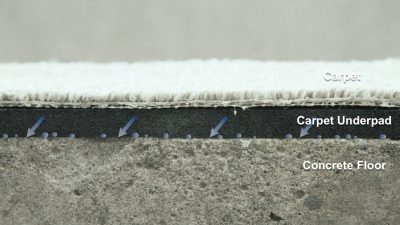 If you’ve got musty smells in your carpeted house, this article will help you fix the problem. Some home ownership challenges are easy to understand and others are mysterious. Summertime mustiness is one of the mysterious kind. I was reminded of this when I got a message from a puzzled man growing weary of battling mustiness rising from his carpet. “If I don’t run the dehumidifier all the time during hot weather”, he explained, “the carpet on the concrete main floor of our home smells strongly of mold. What can I do?”
If you’ve got musty smells in your carpeted house, this article will help you fix the problem. Some home ownership challenges are easy to understand and others are mysterious. Summertime mustiness is one of the mysterious kind. I was reminded of this when I got a message from a puzzled man growing weary of battling mustiness rising from his carpet. “If I don’t run the dehumidifier all the time during hot weather”, he explained, “the carpet on the concrete main floor of our home smells strongly of mold. What can I do?”
Musty Smells – Understanding Why
The first step to solving any problem is understanding it, and this is especially true with musty carpet syndrome. This trouble sometimes happens in above-ground rooms, but it’s most common in basements. That’s because concrete floors covered directly in carpet are so common down there.
Imagine for a moment that you’ve got carpet on a cool concrete floor somewhere, and the outdoor air outside your home is 30ºC (86ºF) with a 90% relative humidity. That’s your typical hot, humid day. The thing to understand about relative humidity is that it’s relative to temperature. The cooler the air is, the less moisture air can hold. So as this warm air makes it’s way into your house through open windows and natural air infiltration, some air will eventually enter the pile of the carpet, sneaking down towards that concrete floor. As the temperature of this humid air declines in contact with the cool concrete, relative humidity skyrockets because the air right there within the carpet is less able to hold moisture. If this cooling continues far enough (and it often does), relative humidity of the air at the interface between your carpet and the concrete will rise to 100%, triggering something unfortunate. In fact, that 86ºF air at 90% relative humidity only needs to cool down to 83ºF to hit 100% relative humidity. They call this the dew point, and they do so for a reason.
Why Carpet Is Often the Musty Smell Culprit
Deep within the pile of the carpet or the underlay, right along the concrete surface, small droplets of liquid moisture will appear in the form of condensation. This is the “dew” that will cause you grief. You won’t see it nor feel it, but droplets of moisture will appear, much to the joy of the kind of microbes that live everywhere on earth. Moisture is all they need to grow, and when they do, they trigger the moldy smells and mustiness that some homes have. It’s at this moment that many people commit a tragic though understandable mistake.
What do you feel like doing when there’s a bad smell in your house? Open a window and increase ventilation, right? In this case that’s exactly the opposite thing you should do, at least if it’s still hot and humid outside. Remember, the source of mold-triggering moisture during summer is the outdoor air itself. This is what transports mold-feeding moisture into your home, so admitting more outdoor air is only going to make things worse. Click here for a video animation of the carpet condensation dynamic. Scroll down to see the video.
Musty Smells – Solving the Summer Carpet Problem
There are only two true fixes for musty carpet syndrome. One is quick, the other only makes sense while you’re renovating. Reducing summertime humidity levels in your house can make the air dry enough so it doesn’t condense even when that air comes in contact with cool concrete. Air conditioning reduces humidity with less electricity than a dehumidifier and without warming your already-hot house. Another option is to get rid of the carpet or install it on some kind of subfloor system that separates the carpet and underlay from the concrete. Those ready-made subfloor tiles you see for sale with dimpled plastic underlay on the bottom do a good job eliminating the dynamic that causes moldy, musty carpets. Some people will tell you that high quality foam underlay offers the same benefits. That’s not true because underlay still allows air to travel through it, permitting warm humid air from cooling down near the concrete and possibly condensing.
The thing about musty carpets is that it’s about more than just an annoying smell. It’s also a sign that indoor air quality in your home isn’t all it should be. Understanding the dynamic of summertime condensation on cool, carpeted floors is an important step towards more healthful breathing. And whatever you do, don’t just open your windows and hope for the best. If condensation is happening in your carpets, more outdoor air will only make your problems worse.
